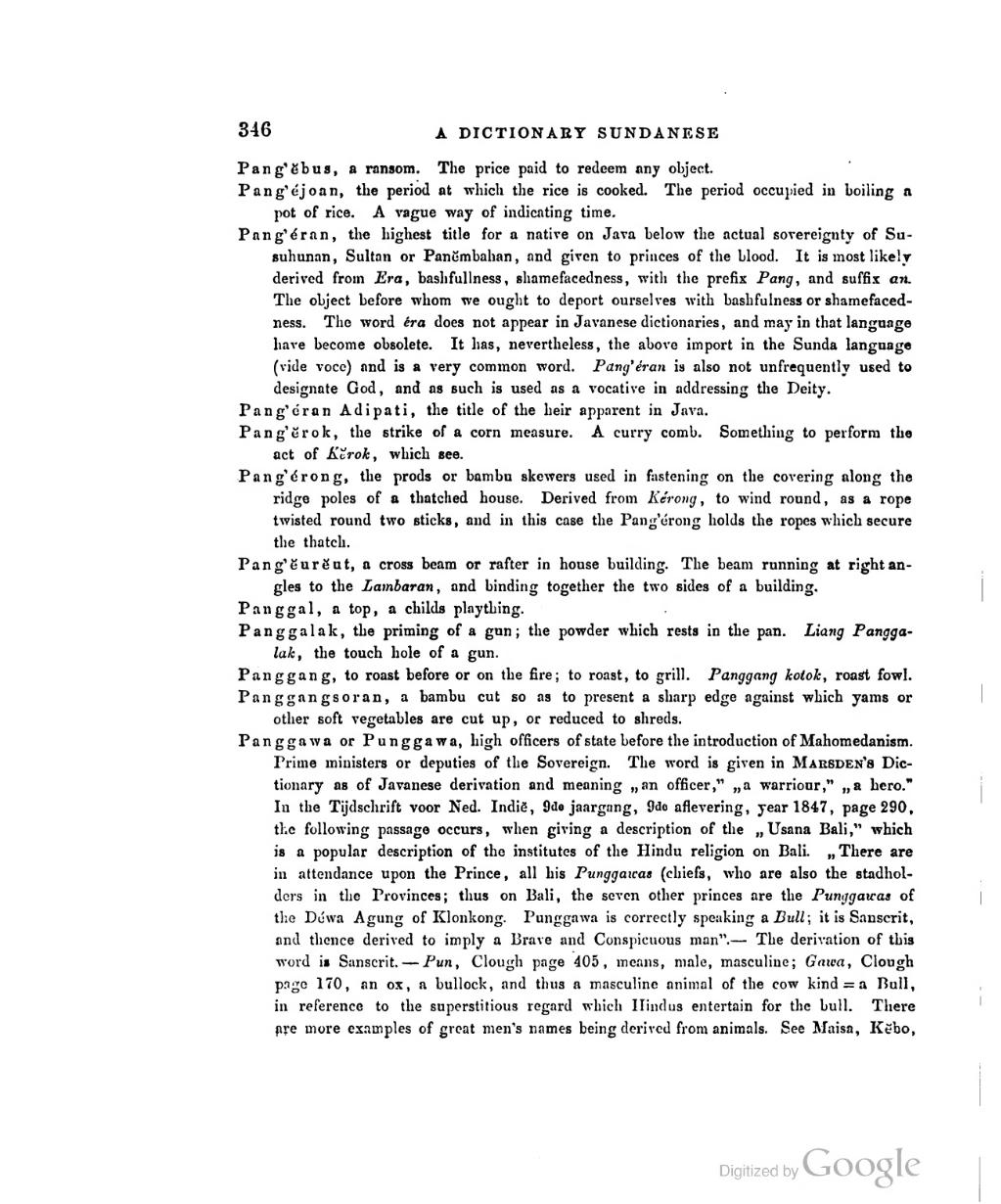346 A DICTIONARY SUNDANESE
Pang'ěbus, a ransom. The price paid to redeem any object.
Pang'éjoan, the period at which the rice is cooked. The period occupied in boiling a pot of rice. A vague way of indicating time.
Pang'éran, the highest title for a native on Java below the actual sovereignty of Susuhunan, Sultan or Panĕmbahan, and given to princes of the blood. It is most likely derived from Era, bashfullness, shamefacedness, with the prefix Pang, and suffix an. The object before whom we ought to deport ourselves with bashfulness or shamefacedness. The word éra does not appear in Javanese dictionaries, and may in that language have become obsolete. It has, nevertheless, the above import in the Sunda language (vide voce) and is a very common word. Pang'éran is also not unfrequently used to designate God, and as such is used as a vocative in addressing the Deity.
Pang'éran Adipati, the title of the heir apparent in Java.
Pang'ěrok, the strike of a corn measure. A curry comb. Something to perform the act of Kĕrok, which see.
Pang'érong, the prods or bambu skewers used in fastening on the covering along the ridge poles of a thatched house. Derived from Kérong , to wind round, as a rope twisted round two sticks, and in this case the Pang'érong holds the ropes which secure the thatch.
Pang'ĕurĕut, a cross beam or rafter in house building. The beam running at right angles to the Lambaran, and binding together the two sides of a building.
Panggal, a top, a childs plaything.
Panggalak, the priming of a gun; the powder which rests in the pan. Liang Panggalak, the touch hole of a gun.
Panggang, to roast before or on the fire; to roast, to grill. Panggang kotok, roast fowl.
Panggangsoran, a bambu cut so as to present a sharp edge against which yams or other soft vegetables are cut up, or reduced to shreds.
Panggawa or Punggawa, high officers of state before the introduction of Mohamedanism. Prime ministers or deputies of the Sovereign. The word is given in Marsden's Dictionary as of Javanese derivation and meaning „an officer," „a warrior," „a hero." In the Tijdschrift voor Ned. Indië, 9de jaargang, 9de aflevering, year l847, page 290, the following passage occurs, when giving a description of the „Usana Bali,"which is a popular description of the institutes of the Hindu religion on Bali. „ There are in attendance upon the Prince, all his Punggawas (chiefs, who are also the stadholders in the Provinces; thus on Bali, the seven other princes are the Punggawas of the Déwa Agung of Klonkong. Punggawa is correctly speaking a Bull ; it is Sanscrit, and thence derived to imply a Brave and Conspicuous man". — The derivation of this word is Sanscrit. — Pun, Clough page 405, means, male, masculine; Gawa, Clough page 170, an ox, a bullock, and thus a masculine animal of the cow kind = a Bull, in reference to the superstitious regard which Hindus entertain for the bull. There are more examples of great men's names being derived from animals. See Maisa, Kěbo,
